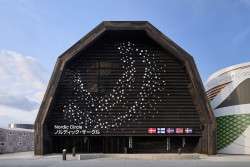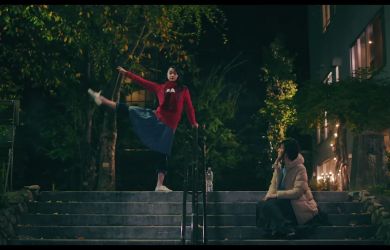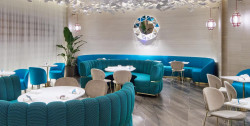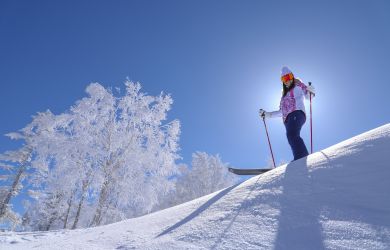
Originally published on metropolis.co.jp on January 2010
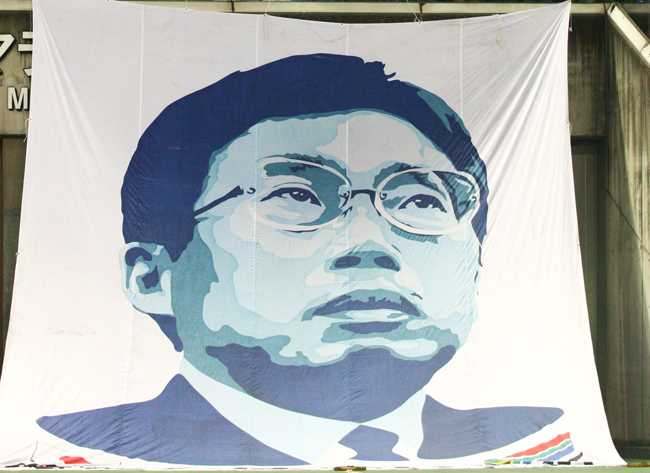
Takeshi Okada really has little left to prove as a coach. He steered Japan to its first-ever World Cup qualification in 1998, took lowly Consadole Sapporo from J2 to J1, and guided the Yokohama F. Marinos to back-to-back J. League championships in 2003 and 2004. This year, the national team coach will take the Samurai Blue to the World Cup in South Africa, where they will beat Brazil in the final and be hailed as superheroes.
Actually, that’s not entirely true. Okada has only set the goal of reaching the semifinals; anything beyond that is fantasy stuff.
Still, semifinals? Most observers believe that’s fantasy football too, and Japan will most likely finish fourth in their group after matches against Holland, Denmark and Cameroon—three exceptionally strong sides. Okada doesn’t seek to justify his semifinal ambitions, but challenges his critics with the retort, “Why not?”
Perhaps the easiest answer is that the players aren’t strong enough. Yet Okada at least realizes that certain weaknesses can be overcome. Size certainly shouldn’t count. Last year’s FIFA World Player of the Year—Lionel Messi of Argentina—is one of the smallest players on the world stage at 169cm, and 2006 recipient Fabio Cannavaro is exactly the same size as former Japan star Hidetoshi Nakata.
“When you look at the size of the Japanese players, you know they will not be able to run 100 meters like [Olympic champion Usain] Bolt,” Okada told a packed meeting at the Foreign Correspondents’ Club of Japan last month. “But there are other aspects to physique, such as being able to run fast over a short distance and endurance, and these are aspects that we can take advantage of.” Well, assuming that you have them.
Okada gets a little off track when he suggests that the Japanese are held back by a lack of footballing history, although he’s right when he says they need to practice more. No, not more: better. Football training here has always been a bit of a joke; Sunday league teams in England train harder than most J. League squads. Former JEF United manager Alex Miller said he was at a loss to explain why there’s no competitive spirit in Japanese players, and couldn’t understand why training was so insipid.
Okada’s answer on the competitive spirit thing is simple: “Even before bushido, Japanese people had the ability to fight, but life is so comfortable now that this ability has been diluted. The fundamental fighting spirit within us has been turned off.” He believes that it’s only a matter of flipping this switch back on again, but when you’ve had a light kick-around, then taken a relaxing bath before popping off for a quick trip to the hairdresser, is it really easy to unlock your inner samurai warrior?
Thus far, it’s been hard to tell. Japan’s friendly matches are invariably against national B teams on a weekend trip to the East, while their competitive matches are against the likes of Bahrain, Indonesia and Hong Kong, none of whom even qualified for the World Cup.
Hong Kong will be among the participants in the East Asian Championship next month in Tokyo, when Japan will also face South Korea and China. Okada has to turn that switch on now, and make sure it stays on until his team faces their real test at the World Cup in June. There are plenty of dim bulbs on his squad, and a jolt of electricity would do them no end of good. Without it, all of Okada’s hopes will just fade into darkness.
East Asian Championship. Feb 6-14.
* Japan vs. China. Feb 6, 7:15pm. Ajinomoto Stadium, Tobitakyu.
* South Korea vs. Hong Kong. Feb 7, 7:15pm. National Stadium, Gaienmae.
* China vs. South Korea. Feb 10, 7:15pm. Ajinomoto Stadium, Tobitakyu.
* Japan vs. Hong Kong. Feb 11, 7:15pm. National Stadium, Gaienmae.
* Hong Kong vs. China. Feb 14, 4:30pm. National Stadium, Gaienmae.
* Japan vs. South Korea. Feb 14, 7:15pm. National Stadium, Gaienmae.


